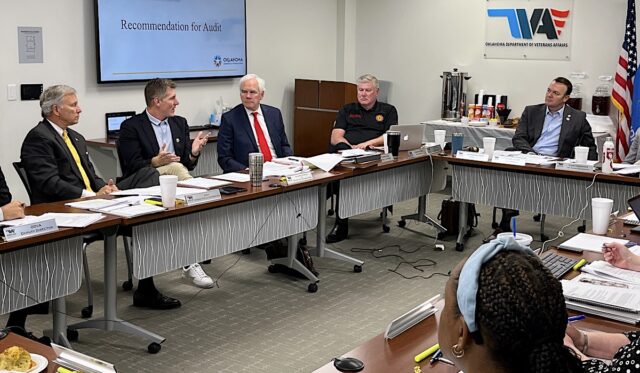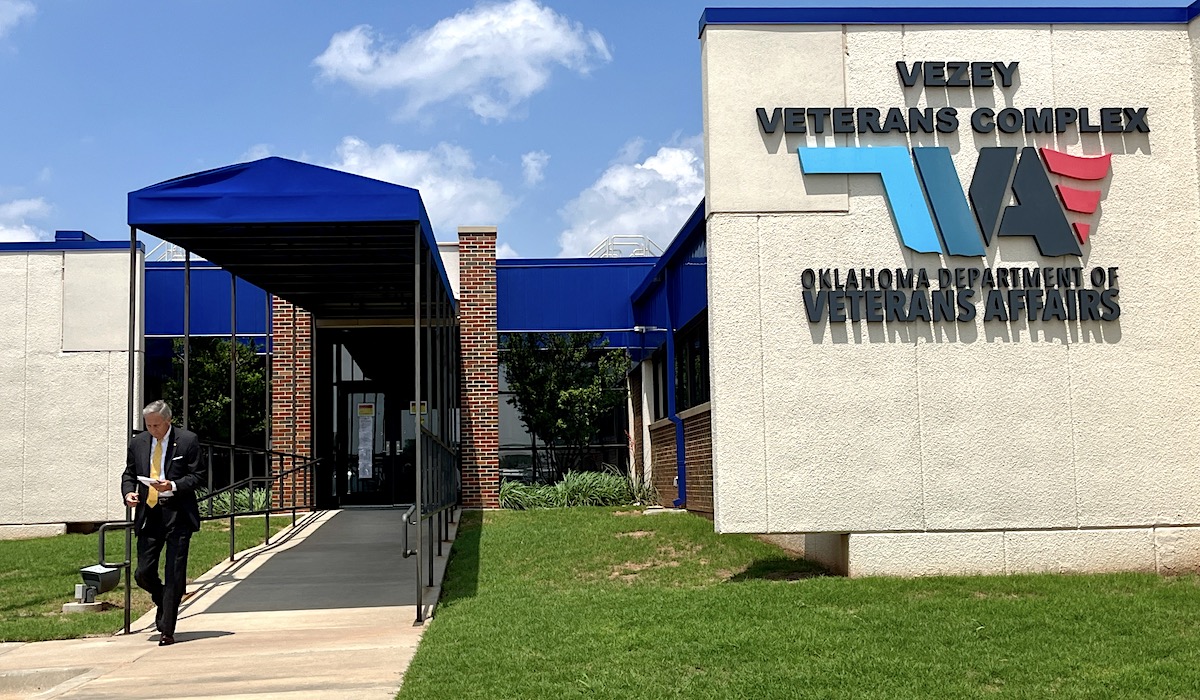
With only a few days left until the Oklahoma Legislature must approve the state’s budget for Fiscal Year 2024, the Department of Veterans Affairs has alerted appropriation leaders that the agency will deplete cash reserves in June and needs a roughly 25 percent increase in state funding to meet its staffing and contract obligations starting July 1.
After realizing the extent of the budget botheration Tuesday night and Wednesday morning respectively, new ODVA director Greg Slavonic and Secretary for Military and Veterans Affairs John Nash approached legislators Thursday to request an additional $10 million to $12 million in appropriations for next fiscal year.
“When we briefed Secretary Nash, he was not totally surprised, but he said, ‘We’ve got to get over to the Legislature right now,'” Slavonic said after today’s meeting of the Oklahoma Veterans Commission, which governs ODVA. “We’re being positive that we will receive the money.”
But “positive” has not been a word associated with this session’s budget negotiations. Lawmakers remain embroiled in a House-Senate dispute over a massive education package, which has delayed and disrupted the rest of the annual budget process. The chambers’ budget chairmen were already expected to work through the weekend ahead of functional deadlines next week.
“I do believe this could possibly impact the budget for this year,” Senate Appropriations and Budget Chairman Roger Thompson said Friday.
Thompson (R-Okemah) learned of the ODVA shortfall Thursday from Nash and Slavonic, while House Appropriations and Budget Chairman Kevin Wallace (R-Wellston) found out Friday. Nash departed halfway through Friday’s nearly four-hour Veterans Commission meeting to present figures to Wallace at the Capitol.
“We will take a responsible approach and meet with leaders from ODVA next week and make the decision if the state will add additional money,” Thompson said. “We must require fiscal responsibility and hold ODVA accountable. However, as we do our examination, I will be very alert to the fact that the state continues to provide services to the veterans in the midst of fiscally righting this ship.”
Wallace declined to comment on the ODVA shortfall.
‘What will be uncovered as they move forward’

A former undersecretary of and rear admiral in the U.S. Navy, Slavonic has led the Oklahoma Department of Veterans Affairs for only two months. On March 10, the Veterans Commission ended its protracted standoff with previous ODVA director Joel Kintsel by firing him after he had refused to attend commission meetings because he insisted some commissioners were “illegitimate” appointees.
The final months of Kintsel’s tenure at ODVA were chaotic and combative, with employees frustrated by a “toxic” work climate and Kintsel’s leave of absence during a failed gubernatorial campaign. Around the same time, problems percolated with the construction of the new Oklahoma State Veterans Home in Sallisaw. After an eight-month work stoppage, ODVA filed a lawsuit against a prior project architect, but by that point the situation had spurred a separate financial crisis.
“My focus has been on Sallisaw,” Slavonic said Friday. “That’s where the heavy lift was, to get Sallisaw money and get it completed.”
The “Sallisaw money” refers to a $10.9 million supplemental appropriation bill slated for final passage Monday. The money is intended to cover roughy half of the $23.3 million in increased construction expenses needed to finish the bungled Sallisaw project. Lawmakers have been asked to appropriate the other half of that figure — roughly $12.4 million — for Fiscal Year 2024, although those funds could either be provided this session or as a supplemental appropriation for the agency when the 2024 legislative session begins next February.
But none of those dollars will help ODVA meet payroll and other obligations starting July 1. Slavonic and ODVA chief financial officer Lisa White said increased costs and decreased revenues have left the agency estimating a roughly $1 million-per-month budget shortfall for Fiscal Year 2024.
Walking from the Veterans Commission meeting to his truck in the ODVA parking lot, Nash conveyed a similar message.
“It’s a $10 million to $12 million shortfall based off of lower residency rates post-COVID, which has affected the longterm care model nationwide,” Nash said. “We essentially have 30 percent less residents, but our fixed costs are fixed. So we have to make up that gap, and then we have to fix it structurally on the back side so that we align with reality of the longterm care model post-COVID.”
ODVA’s seven residential veterans centers — in Ardmore, Claremore, Clinton, Lawton, Norman, Sulphur and Talihina — are not alone in seeing cost overruns and revenue losses. Nursing homes in general have faced the same fate, and this week’s conclusion of the federal COVID-19 Public Health Emergency declaration is projected to create a $57-per-patient-per-day funding gap for Medicaid patients. Earlier in the week, Thompson mentioned the issue during a press conference.
“One of the main areas of concern I have (…) is our nursing home care. We’ve got some nursing homes, especially in rural Oklahoma, that are really struggling,” Thompson said. “So we’re looking at a number this year — of just keeping them open and operating — of an additional $45 million. Now, I personally believe that there is enough money within the Oklahoma Health Care Authority that we can simply just repurpose that $45 million and will not have to appropriate new money to them to do that.”
On Friday, Thompson praised Slavonic for bringing in an additional financial expert — former state employee and CPA Cathy Menefee — to unpack ODVA’s books.
“While my frustration remains with ODVA, with new leadership and certainly with Cathy helping, my anticipation to a time of responsible fiscal reporting could now be on track,” Thompson said. “I am not sure what will be uncovered as they move forward.”
Slavonic said he and White knew ODVA’s fiscal picture posed challenges in Fiscal Year 2024, but he said receiving Menefee’s full report this week sounded the alarm bells.
“I was aware of it, but I just didn’t know how dire the situation was,” Slavonic said. “And as we kind of drilled down in talking about the Sallisaw situation, I think the state Legislature really kind of wondered, if that’s a situation, might you have other issues?”
House Veteran and Military Affairs Chairman Josh West (R-Grove) was absent from the Capitol earlier this week owing to illness, but he expressed shock and frustration to learn about the new request for up to $12 million more in state appropriations. State funding is sent to agencies monthly, meaning ODVA faces a roughly $1 million-per-month shortfall.
“I have been aware of the Sallisaw Veteran’s Home funding issue for sometime, and we have been working on a solution with the appropriations chairmen in both chambers,” West said. “This is the first I have heard of the additional shortfall, and it will be tough to address with two weeks left in regular session. I would expect to meet on the matter sooner than later.”
ODVA shortfall nearly 9 percent of agency budget
When the newly discovered revenue shortfall was mentioned during Friday’s meeting of the Veterans Commission, communications director Jennifer Bloomfield handed out a two-page memo describing the agency’s FY 2024 “budget needs.”
“Revenue estimates are based on historical circumstances that do not translate to current occupancy levels,” the document stated. “Revenue for FY 23 is 13 percent below target, but expenditures are 10 percent above. (…) All reserve funds will be depleted leaving no working capital for the processing of FY 24 invoices at the beginning of the [fiscal year]. Assuming no operational changes, an additional $10 million should be requested in appropriations for the continued operations of the centers.”
For FY 2023, ODVA received $40.9 million in state appropriations. The agency’s entire budget is about $136 million, with federal funding, private pay from residents and meal tickets providing the rest of the funding.
A $12 million shortfall would create just under a 10 percent gap in the agency’s entire budget.
“The largest portion of that appropriated dollars will go toward the veterans centers for salaries and then to operate the central office for administrative costs,” said White, ODVA’s chief financial officer.
A pair of “other thoughts” were listed on the document provided to the Veterans Commission on Friday:
- “Administrators need financial training and held to operate within their budgets.”
- “Other revenue sources should be explored strategically (like Medicaid certification).”
White and other staff presented a variety of fiscal snapshots to the Veterans Commission, with many commissioners expressing appreciation that they were finally receiving deeper information than had been provided under Slavonic’s predecessor.
“There’s a lot of bad numbers here in terms of what is going on,” Commissioner Kevin Offel said toward the end of Friday’s meeting. “I’ve been here for a year and am just getting this information.”
As he left Friday’s meeting to speak with Wallace, Nash said he’d had “terrific” conversations with legislators Thursday, although he declined to specify with whom he had met.
“The legislators were, I think, appreciative that we came and reported an issue directly and transparently, and then they have been terrific to work with to navigate a set of solutions,” Nash said.
Asked if failing to provide ODVA with the additional $10 million to $12 million requested would impact payroll and other obligations, Nash said, “Theoretically.”
“But I’m very confident that the Legislature understands the situation and is going to act quickly and appropriately,” he said.





















